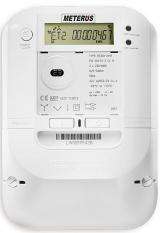June 13, 2012 report
EU watchdog agency warns of privacy issues with smart meters

(Phys.org) -- As utility companies the world over seek ways to wring more use out of the electricity they provide, new technology is introduced to better manage how that electricity is consumed and when. One such example is the idea of a smart grid where smart meters replace conventional meters at home and business sites which are connected to computers at a central site. The idea is that if energy consumption can be monitored in very near real-time, energy companies can better allocate resources and hopefully make the whole system more efficient. Unfortunately, as Giovanni Buttarelli, an assistant supervisor with the independent watchdog group European Data Protection Supervisor, points out in a new report, sometimes good intentions can give way to unexpected side effects and in this case it’s the possibility of smart sensors giving away private information about people as they go about their daily lives.
The idea of a smart grid has gained traction in recent years as utility companies face new constraints. Their job is to provide all the power that everyone in a given area may want or need, yet they are overseen by governmental agencies that work to keep prices down, while other agencies seek to force them to reduce carbon emissions, a difficult task to say the least when most rely on burning coal to produce their product. Smart grids using meters would allow power companies to see how much electricity is being used and where, and then to allocate power based on those numbers. More could be sent where more is needed, less to where less is needed. The result would be more efficient distribution which hopefully helps to keep costs down for everyone.
The problem comes about, Buttarelli says, because smart meters might be a little too smart. He points out that readings coming from a smart meter can be analyzed by a computer to the extent that those looking at the data could discern not only when people are home or sleeping, but what type of electronics they have and use, including medical equipment. So sensitive are the meters and computers, that engineers can actually figure out which channel on a flat screen television is running in someone’s house. Because of this, there exists the risk that private user data could wind up in the hands of people or entities other than those at the power company. Burglars, for example, would love to know when a family is away on holiday, and those that sell things might like to know what electronic gadgets a family uses. The solution, Buttarellis says is to put laws in place forbidding utility companies from sharing such data before such a grid is put in place.
The report was written in response to a European Union’s commission announcing plans to implement a smart grid all across Europe by 2020.
© 2012 Phys.Org


















